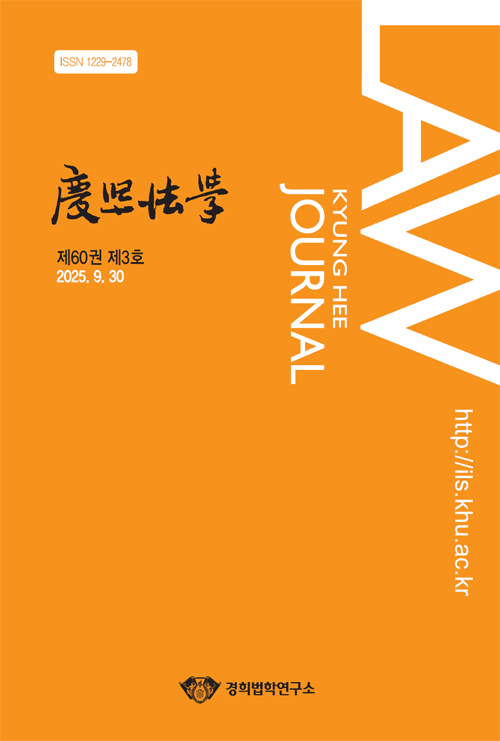- 영문명
- A Legal Analysis of Electronic Wills under the Uniform Electronic Wills Act in the United States
- 발행기관
- 경희법학연구소
- 저자명
- 곽민희(Minhui Gwak)
- 간행물 정보
- 『경희법학』제60권 제3호, 3~41쪽, 전체 39쪽
- 주제분류
- 법학 > 민법
- 파일형태
- 발행일자
- 2025.09.30
7,480원
구매일시로부터 72시간 이내에 다운로드 가능합니다.
이 학술논문 정보는 (주)교보문고와 각 발행기관 사이에 저작물 이용 계약이 체결된 것으로, 교보문고를 통해 제공되고 있습니다.

국문 초록
이 논문은 우리 민법상 유언 방식의 엄격한 요식성과 그 역사적·법적 근거를 고찰하고,현대 사회의 디지털화와 코로나19 팬데믹 등으로 인한 대면 작성의 어려움 속에서 제기된전자유언 제도의 도입 필요성을 비교법적으로 검토한다. 현행 민법은 자필증서, 녹음, 공정증서, 비밀증서, 구수증서의 다섯 가지 방식에 한해 유언의 효력을 인정하며, 유언의 진정성확보, 분쟁 예방, 유언자의 심사숙고를 위한 증거·경고·보호 기능을 중시한다. 그러나 스마트기기 확산과 원격 의사표시의 일상화는 이러한 형식 요건이 유언자의 최종 의사 실현과제도 활용을 제약하는 한계를 드러내고 있다. 이에 본 연구는 먼저 미국 통일검인법전(Uniform Probate Code: UPC)을 검토하여 현대적 유언 개념과 유언의 방식, 그리고 소위, 무해한 하자법리(harmless error rule)를 통해 형식주의와 실질적인 유언자의 의사 보장을 조화시키는 입법 구조를 분석한다. 이를 토대로 2019년 미국 통일주법위원회가 제정한 통일전자유언법(Uniform Electronic Wills Act: UEWA)을 심층적으로 검토한다. UEWA는 전자유언을독립된 제도로 명시하며, 전자기록의 정의, 전자서명 및 전자적 입회(electronic presence),원격 공증, 자기증명유언의 전자 작성과 첨부 등 구체적 작성·증명 절차를 규정하여 종이문서와 동등한 증거력과 안전성을 확보한다. 텍스트로 읽을 수 있는 기록을 원칙으로 하되 음성·영상 녹화는 보조증거로만 허용하고, 태블릿·스마트폰·컴퓨터 등 다양한 전자기기에 저장된 유언도 전자유언으로 인정할 수 있는 가능성을 열어 두었다. 또한 UEWA는 주(州)별 선택 조항을 통해 무해한 하자법리를 적용하거나 완화 규정을 둘 수 있도록 하여 각주의 기존 상속·유언법과의 조화를 도모한다.
이러한 비교법적 분석을 통해, 이 글은 우리 법이 전통적 형식주의의 핵심 가치를 유지하면서도 디지털 전환의 흐름에 부응해 유언자의 자기결정권과 재산권을 실질적으로 보장할수 있도록 하는 구체적 입법 방향에 대해서 검토한다. 즉. 우리 법이 녹음유언 규정을 통해일정 부분 디지털화에 대응하고 있음을 긍정적으로 평가하면서도, 전자유언을 별도의 유언방식으로 명문화하고, 전자서명·원격 인증 및 자기증명 제도를 포괄하는 입법적 보완이 필요하다고 제언한다. 특히, 유언의 진정성과 유언능력 확보라는 전통적 가치와 증거·경고·보호 기능을 훼손하지 않으면서, 기술 발전이 제공하는 효율성과 편의성을 균형 있게 수용하는 체계적 입법 설계가 중요하다. 구체적으로는 전자유언의 작성·보관·철회 절차와 증거 기준을 명확히 하고, 원격 작성과 검인 절차가 법적 안전장치 속에서 운용될 수 있도록 하는규범 정비가 요구된다. 즉, 전자유언의 정의·방식·증명 및 철회 절차를 명문화하는 단계적입법과 더불어, 기술 발전에 따른 새로운 증거방식과 절차적 하자법리와 같은 유언자의 의사 실현을 위한 해석론의 발전을 기대한다.
영문 초록
In Korean civil law, the testamentary system is grounded in the principle of freedom of legal acts and the institution of private property. Testamentary freedom is protected as a constitutional right, deriving from the constitutional guarantees of property rights and the pursuit of happiness, and thus constitutes part of the testator’s general freedom of action. However, such testamentary freedom has traditionally been restricted by the strict and formalistic requirements of testamentary forms. In other words, since a will is a formal act, any will that fails to comply with the statutory forms prescribed by law is invalid, and the subject matter of a will is also limited to matters defined by law.The Korean Civil Code expressly codifies this formality requirement, and under the current law, five types of wills are recognized: holographic wills, audio-recorded wills, notarized wills, sealed wills, and oral wills (Civil Code Articles 1065, 1066 et seq.). Among these, the audio-recorded will is notable in that it acknowledges a form of testament that anticipates new technologies, and it was an exceptionally innovative provision at the time of enactment, rarely found in comparative legislation. Yet, with the rapid technological developments of modern society, the need to reform the rigid testamentary forms of current law has increasingly been recognized. Moreover, during the COVID-19 pandemic, circumstances arose in which it was impossible to execute wills in the traditional forms, highlighting the inadequacy of the existing system in addressing such crises. Consequently, there has been growing momentum for the introduction of digital wills—that is, electronic wills. Fortunately, Korea’s recognition of audio-recorded wills provides a certain degree of readiness for digital adaptation. Nonetheless, in order to ensure legal certainty and to enhance the substantive utility of testamentary provisions, more specific supplementary legislation is now required. At the same time, the importance of testamentary form in guaranteeing the authenticity of the will and the testator’s testamentary capacity remains unchanged in the digital era. Thus, the central issue in discussions on electronic wills is where to strike the balance between the formal requirements of wills and the flexibility afforded by digitalization.
From a comparative law perspective, only a limited number of countries have fully codified electronic wills to date. The United States is a particularly valuable reference, as certain states introduced legislation on electronic wills at an early stage, and in 2019 a federal-level statute was enacted. Most notably, in 2019 the Uniform Law Commission (ULC), which seeks to promote the harmonization of state law in various fields, adopted and promulgated the Uniform Electronic Wills Act (UEWA) as a model statute on electronic wills.
This paper therefore examines the concrete provisions of the UEWA, including the definition and permissible forms of electronic wills, and considers the legislative implications that can be drawn for the introduction of electronic wills into Korean law.
목차
Ⅰ. 序
Ⅱ. 미국의 통일전자유언법상 전자유언 제도
Ⅲ. 우리 법상 유언의 방식과 전자유언
Ⅳ. 結語
참고문헌
키워드
해당간행물 수록 논문
참고문헌
교보eBook 첫 방문을 환영 합니다!

신규가입 혜택 지급이 완료 되었습니다.
바로 사용 가능한 교보e캐시 1,000원 (유효기간 7일)
지금 바로 교보eBook의 다양한 콘텐츠를 이용해 보세요!



